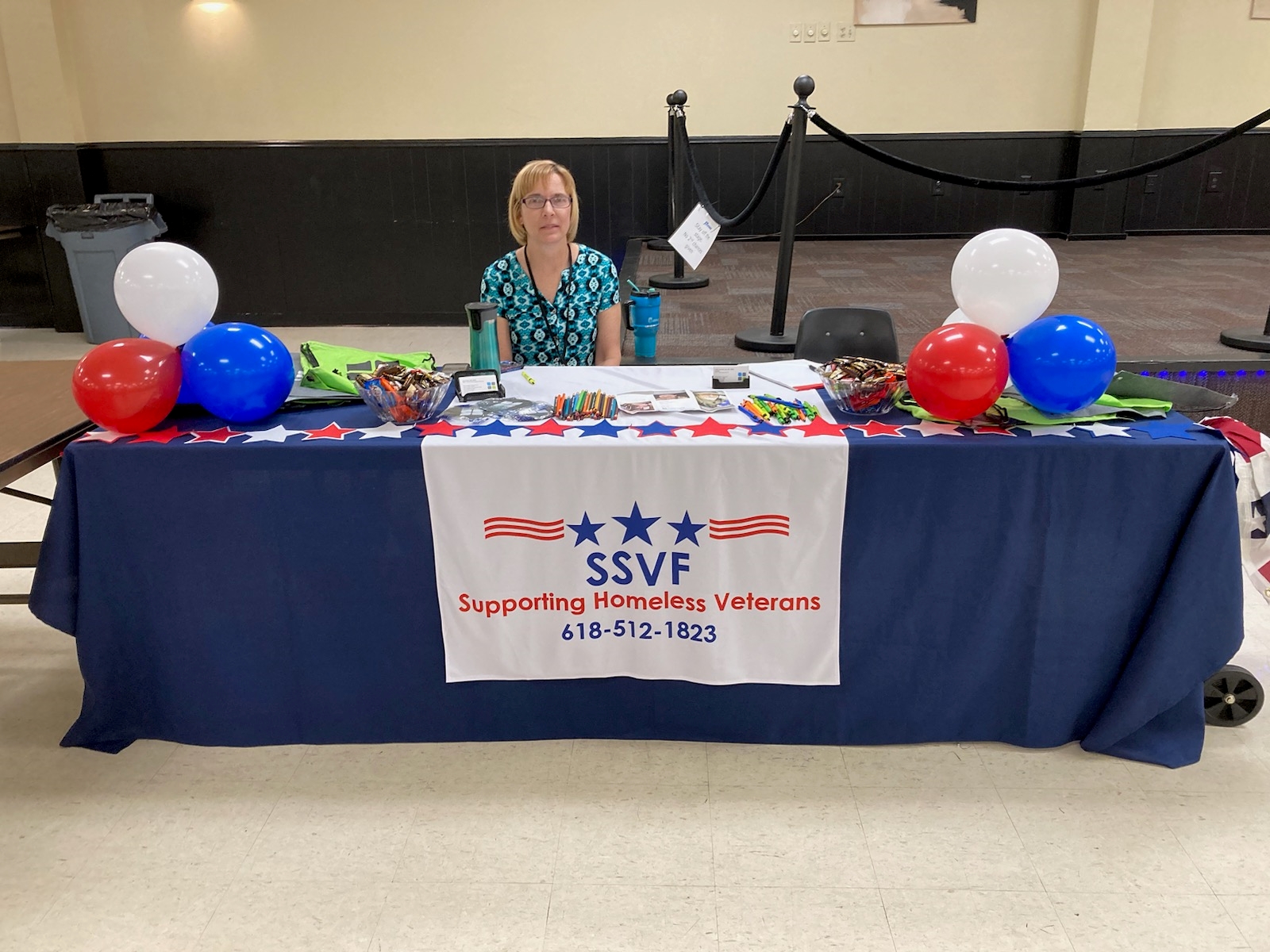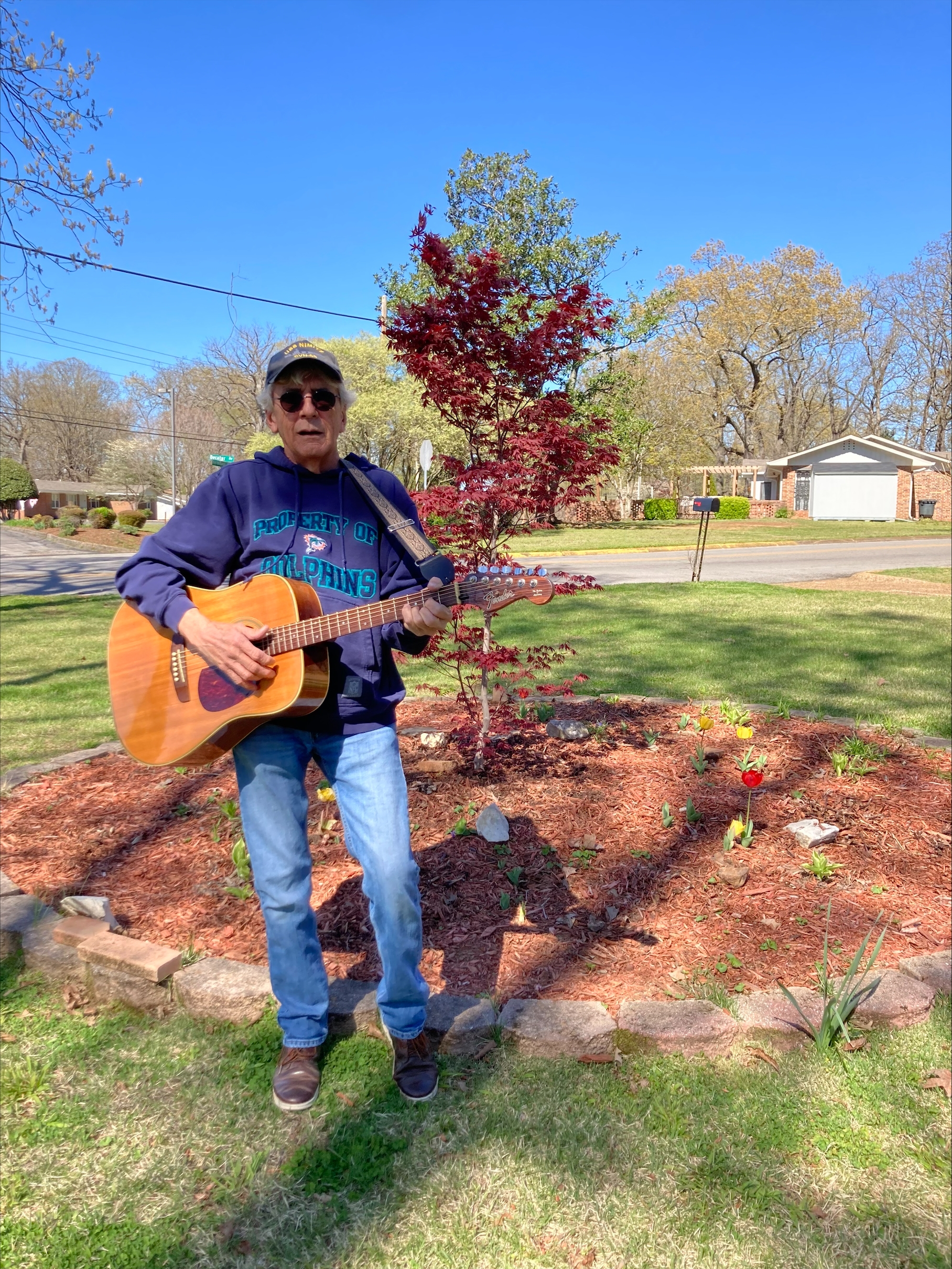Veterans Day offers an opportunity to reflect on issues impacting veterans and their loved ones. Chestnut Health Systems™ is working toward a vision where no veteran is left without the support they need to achieve housing stability.
The most recent data estimates that more than 35,000 veterans experienced homelessness in the United States in 2022, an increase of 7.4 percent over 2021, according to the US Department of Veterans Affairs (VA).
Support Services for Veterans Families (SSVF) is a national program through the U.S. Department of Veterans Affairs (VA) and assists veteran households who are unhoused or in danger of becoming unhoused.
Through the program, veterans receive help with housing placement, rental assistance, and case management, along with access to healthcare, financial planning, and employment services.
 Case Manager Jodie Krueger promotes the program
Case Manager Jodie Krueger promotes the program
Chestnut runs the SSVF program for Madison and St. Clair counties in Illinois through a VA grant. Six of the 11 staff members are veterans themselves.
One challenge to overcome is that the same strength that prompts veterans to step up and commit to putting others first can translate to reluctance when it comes to requesting assistance for themselves.
“Asking for help is not their strong suit,” said Tim Snyder, SSVF Associate Director for Chestnut, and Air Force vet. Even in dire circumstances, it can take some convincing for the vet to accept help. One way to combat this tendency is recruiting fellow veterans to run the program, as veterans “speak their own language,” according to Snyder.
Recently, the team received word that a 65-year-old grandma was sleeping in her car with a 16-year-old grandson.
“If we have a veteran sleeping on the street, our goal is to get them off the streets that day,” said Snyder. The team worked with a hotel owner who rents to the program at a discount. Within two and a half hours, she and her grandson had a roof over their head, and they’ll stay there until the team can identify a more permanent solution.
Even in that case, it took some convincing for the veteran to accept help. Another challenge is educating veterans that the program exists.
Outreach Specialist Jason Brownlee is a former unhoused vet embedded in the community spreading word of the program. He has referred many veterans who have completed the program and become stably housed. One day he arrived at Chestnut’s Belleville location to be told someone was there to see him. Brownlee had met this veteran on the streets and handed them a business card.
The veteran asked for help. According to Brownlee, veterans share a bond based on their unique experience. They can have a whole conversation with a single glance.
“The veteran cried and said ‘hey, I need your help.’ I ain’t gonna lie, I cried too. I said ‘I know exactly where you are. I’ve been there. I know what it’s like to not have. I know what it’s like to want to do better, but you can’t do better because you can’t get out of the situation you’re in.’”
Brownlee helped the veteran develop a plan and they are now employed and stably housed.
A roof overhead
 Gregory Snyder, Navy Veteran
Gregory Snyder, Navy Veteran
After helping Navy veteran Gregory Snyder avoid homelessness when his housing situation fell through, the SSVF program provided some household essentials to get him started.
“It was like Christmas morning,” G. Snyder said, describing his case manager pulling up with a car full of items, such as a vacuum cleaner. But there was one item missing: a fire extinguisher. Snyder reported to the USS Nimitz during his time in the Navy. “She was a showboat. We went all over the world showing the flag,” he said. In five years, he saw 30 counties. One night, a plane crashed down, killing 15 and injuring 45. The crew was called to the deck with fire extinguishers to fight a roaring fire for seven hours.
“There is nothing in the world like a fight deck fire because you have nowhere to go. You’re at sea,” Snyder said. “You can’t call the fire department -- You are the fire department.” He’s only recently been able to speak about this memory that has made a fire extinguisher an absolute necessity for his state of mind.
When one hears G. Snyder speak, it is no surprise to learn that he spent 40 years in radio presenting the news, calling sporting events, and selling advertising. Then, one day, G. Snyder woke up outside the radio station having fallen on the ice and everything changed.
In the emergency room, the doctor scolded G. Snyder for waiting two days to come, saying he had a “brain bleed,” or a hemorrhagic stroke, an emergency condition in which a ruptured blood vessel causes bleeding inside the brain.
Snyder began experiencing forgetfulness that he was told would worsen over the years.
“I used to try to hide it. But finally, I had to tell people, he said. “I’ve re-introduced myself to a few friends two or three times.” He’s been on disability since and unable to work.
After a housing situation fell through, he found an apartment that required money up front he did not have with only his disability income available.
That’s where SSVF came in and prevented G. Snyder from ending up on the streets. In the last six months, Snyder has become a productive tenant, taking care of much-needed landscaping at the property.
“If you’re a veteran and you’re in a situation where you’re homeless, reach out to the SSVF staff. They can help you,” G. Snyder said.
Committed to the cause
The VA grant requires Chestnut to serve a minimum of 105 Veterans per year. Chestnut SSVF has served 137 veterans by October 2024, outpacing the grant expectation by 130 percent. Thirty-two of those veterans helped through the program have been female and 80 disabled. Eighty-three children have also benefited from the services.
SSVF offers a service called Shallow Subsidy, which was introduced during the COVID pandemic to help combat rising rent costs. If a veteran has steady income, demonstrates the ability to pay a portion of their bills, and the landlord approves, SSVF can cover 50 percent of their rent for up to two years. The service can be extended beyond the initial two years if needed.
SSVF also offers a service called Incentives, designed to encourage landlords to rent to veterans who may face challenges, such as legal issues or recent evictions. With this service, SSVF makes direct payments to landlords, providing them with a financial safety net. These incentives help reduce barriers to housing and increase landlords’ willingness to rent to veterans who might otherwise struggle to find secure stable housing.
Chestnut recognizes veterans as a distinct group who have shown extraordinary courage and dedication to contribute to society. Veterans often put their lives at risk and endure significant physical and emotional hardship.
“Veterans are often exposed to a lot more than the average person will ever experience,” said G. Snyder. “They carry the weight of seeing and living with things most people never have to face.”
When they return home, many veterans face challenges such as physical injuries, mental health struggles, unemployment, and homelessness. Supporting veterans is a moral responsibility—a way to express gratitude and ensure that those who served are not overlooked or forgotten.
“It is my privilege to come to work each day and serve those who served our country,” said Snyder from Chestnut. “We are not only uplifting their lives but strengthen the fabric of our entire community.”
To learn more about SSVF services, visit chestnut.org, call 618-512-1823, email SSVF_DEPT@chestnut.org, or scan the QR code. All services are free, and eligibility requirements apply.